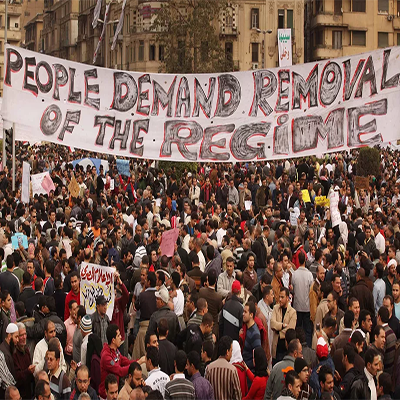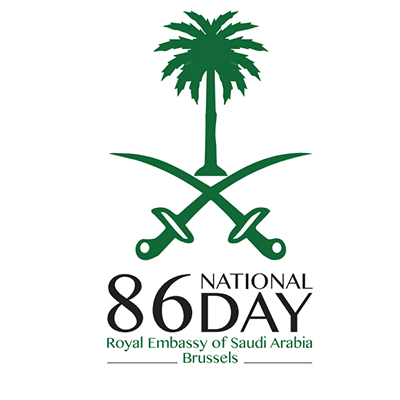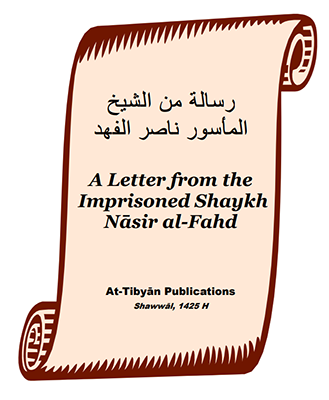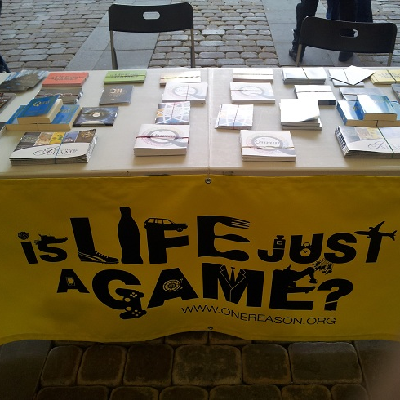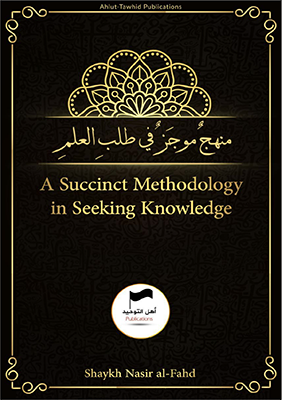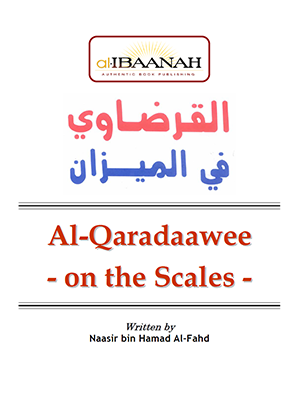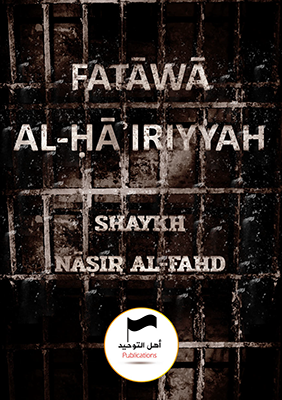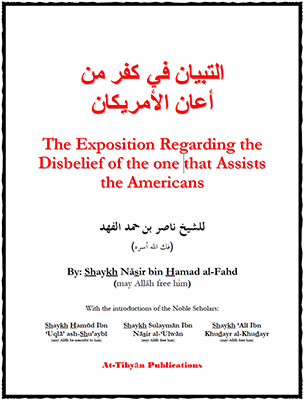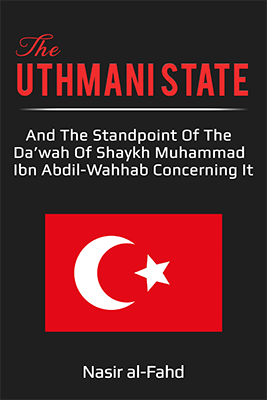Nasir bin Hamad bin Humayn al-Fahd from the Faraheed from the Asa’idah, from al-Rawaqah from ‘Utaybah, whose ancestors go back to the tribe of Bani Sa’d bin Bakr bin Hawaazin from ‘Adnaan who were from those that nursed the Messenger (صلى الله عليه وسلم). His mother is Nura al-Ghazziy and her lineage goes back to the clans of ad-Dawasir.
His family's place of residence was in al-Thuwayr, and it is from the villages of al-Zulfī, and his father Shaykh Hamad Ibn Humayyin moved to Riyadh to work with Shaykh al-'Allamah Muhammad Ibn Ibrahim (رحمه الله), so he stayed with him for 18 years until he passed away.
Birth and Upbringing
He was born in Riyadh in the month of Shawwaal 1388 and that is where he was raised. After he completed his Secondary education, he began studying Engineering in Al-Malik Sa'ud University, and he was outstanding in it and the top student. And when he reached the 3rd year (of Engineering studies), he discontinued, so he transferred from it to the College of Shari'ah in The Islamic University of Imam Muhammad Ibn Sa'ud. And he memorised the entire Qur'an in 3 months at the age of 24, and he wrote on the first paper (page) from his Mus'haf that he was memorising from:
Accomplished - with the Praise of Allāh and His Success - the completion from it (i.e. the Qur'an) and memorised from cover to cover in a single achievement after 'Asr on Sunday 29/11/1412 from the Hijrah of the Mustafah (صلوات الله وسلامه عليه), and the beginning of its memorisation was in the beginning of Ramadan in the same year, and all Praise belongs to Allah who by His Praise the righteous deeds have been accomplished.
His Teachers & Study
He studied in the College under a group of teachers, most popular of them:
Shaykh ‘Abdul-Azeez bin ‘Abdullah ar-Rajihi
Shaykh ‘Abdul-Azeez bin ‘Abdullah al-ash-Shaykh
Shaykh Salih al-Atram
Shaykh ‘Abdullah ar-Rukban
Shaykh Zayd bin Fayyad (رحمه الله)
Shaykh Ahmad Ma’bad
And many others.
He was given an Ijazah in the college in the year 1412 AH finishing the top of his class. He was requested to study at the College of Shari'ah and Usul al-Deen again, so he chose Usul ad-Deen; Department of Creed and Contemporary Sects. He was also appointed as an Ustadh (teacher) in Thailand and he debated a Jahmi over there. He gained victory over him and the audience applauded him.
He exerted efforts at the time in pursuit of stockpiling books, reading and researching, and he was very fond of reading. His son (Mus'ab Ibn Nasir al-Fahd) said,
I did not see him for a single hour at home without a book (in his hands), and he would take a book with him to the car and read it at the traffic lights, and if I were to say he reads 15 hours a day, I would have grievously wronged him unjustly.
He excelled & proved to be outmatched in most fields of the Shari'ah; In 'Aqeedah and what is connected to it, Hadith, Rijal (the science of determining the reliable from the non-reliable narrator), Fiqh according to all of its Schools of Thought, Usul al-Fiqh, and Fara'idh (inheritance).
He has an exceptional ability to derive rulings and to make conclusive statements.
He is also a Scholar of History and Genealogy as Shaykh Walid al-Sinani (أحسن الله فكاكه) was asked about some of the genealogies - as he is an expert in Genealogy who is unrivalled - he replied, "Ask that As'adi" meaning Shaykh Nasir al-Fahd.
His son said,
And some professors of 'Aqidah in the Imam (Muhammad Ibn Sa'ud) University have informed me, they said: 'Your father was my peer in studying {Masters Degree}, and he was the most intelligent man among us by heart, and the quickest to memorise and understand, and there's nothing to criticise from him except for his harshness.'
His also said,
And it has reached me that an Ustadh (teacher) in the Creed Department said to his students one day: 'There was a man in our department who had alot of misconceptions, and no one was able to stand up to face him except for Nasir al-Fahd.'
His Writings
He has written many books and articles, including:
- The Choices and Opinions of Shaykh al-Islam in Grammar and Morphology (Printed)
- The Notification of the Oppositions of (the Book) al-'Itisam (Printed)
- Establishing the Evidence for the Obligation of Breaking the Idols
- The Exposition Regarding the Disbelief of the One That Assists the Americans Part One: The Campaign Against Afghanistan
- The Exposition Regarding the Disbelief of the One That Assists the Americans Part Two: The Campaign Against Iraq
- The Clarification of the Danger of the Peace Process Against the Muslims
- The Ascertainment of the Issue of Clapping
- Notices Concerning the Books of (Hadith) Checking for Kitab at-Tawheed
- The Censure in Clarification of What the Bayan al-Muthaqqafin Contains of Falsehood
- Jarh wat-Ta'dil According to Ibn Hazm adh-Dhahiri
- The Ruling Upon Alcohol Based Perfumes
- A Refutation Against the Rafidah in their Accusation Against the Companions Tampering With the Qur'an
- A Letter to a Modernist
- A Treatise on the Ruling of Singing the Qur'an
- A Treatise in Refutation Against the Misconceptions of the Murji'ah Taken From the Words of Shaykh al-Islam Ibn Taymiyyah (رحمه الله)
- A Treatise Concerning the Shortening of the Travelers (Prayer) Behind the Resident (Imam)
- A Treatise Clarifying the Legality of Harshness Against the Rafidah
- Biography of Shaykh Muhammad ibn Ibrahim al-ash-Shaykh (رحمه الله) (Printed)
- Protecting Majmu' al-Fatawa from Misprint and Typographical Errors (Printed)
- The Islamic Video and 'Islamic Alternatives' (Printed)
- Refuting the Doubts of Hasan al-Maliki
- The Clothing of a Woman in front of Other Women
- A Summary of the Falsehoods of al-Qardawi
- Encyclopedia of the Settled Families of al-Asa'irah Clan (Printed)
- The Methodology of the Earlier Scholars in the matter of Tadlis
- The Stances With the Stances (A Refutation Against Some of the Comments of the Modern-Day Murji'ah Made Against the Book at-Tibyan)
- The Legality of Using Weapons of Mass Destruction
And other beneficial essays and works.
Imprisonment & Trials
In the year 1415 AH he was arrested and entered al-Ha'ir prison, and he remained in that prison for 3.5 years and was released in the year 1418 AH. After he was released, he became active on the Internet but he later turned away from it, due to the time restraint. As the visitors were increasing in numbers, and he wasn't able to make time for it, he organised a gathering at his house on Saturday and Tuesday every week between Maghrib and 'Isha', which revolved around mentioning new Hadiths and Reports, and the gathering was getting crowded to the extent that all sides (of the room) was filled up with people, so they would have to make a row right in the mid-point of the gathering (in-line with the Shaykh).
When Allah tested the Muslims with America going to war with Afghanistan, the Shaykh exerted efforts to incite the believers to support their brothers and warning them from allying with the Kuffar against the Muslims, and he did not change his stance until he was wanted (by the Saudi Taghut govt), then he was imprisoned in the year 1424 AH. Since then the Shaykh has been in solitary prison, and he is prevented from seeing his family or speaking to them.
Allah has opened up for him in prison from His blessings, and increased him in an abundance of knowledge. For instance he completed the memorisation of the 9 books of Hadith from the 'Yahya compilation', and he memorised a good number of Books and Mutun. He also read Majmu' al-Fatawa six times and he authored 85 Treatises. Furthermore he made the Usul al-Fiqh and Usul al-Tafsir of Shaykh al-Islam (Ibn Taymiyyah) into a poem consisting of more than 800 lines of poetry.
A brother who recently got released from prison said:
Verily, some of the soldiers would say, 'What is with this brackish guy - he intends Shaykh Nasir - he sleeps for 4 hours, and spends the rest of his time praying and reading!'
Prison Conditions
Shaykh Nasir al-Fahd was put through extreme conditions in prison by the Saudi government such as solitary confinement, mental and physical torture, isolation from the other prisoners and acts of humiliation were committed against him. Does a man who memorised the Kutub at-Tis'ah (the nine books of Hadith: Bukhari, Muslim, Abu Dawud, Tirmidhi etc.) deserve to be treated in such a manner?
For more information see, Shaykh Nasir al-Fahd Prison Conditions by Shaykh Ahmad Musa Jibril
Praise of the Scholars for Him
Al-'Allamah Hamoud bin Uqla ash-Shu'aybi (رحمه الله) said in his commendation for (the book), 'The Exposition Regarding the Disbelief of the one that Assists the Americans':
And the Shaykh, Nasir al-Fahd, may Allah grant him success, has many blessed efforts, for he has taken part and expended effort in giving victory to the truth and its people and repelling falsehood and its people. He has confronted them in many well-known books and essays. We ask Allah to write for him a goodly reward and keep him firm upon that.
His son said,
And some of our brothers have informed me, stating: 'Whenever the brothers would come to Shaykh Hamoud ash-Shu'aybi with a misconception for him to respond to, he would reply: Has Shaykh Nasir responded to it?'
Shaykh al-Muhaddith Sulayman ibn Nasir al-Alwan said (in the same place),
So may Allah strengthen this Shaykh. How good it is that which his hands have written! It is worthy of a good reception from the People of Knowledge and seekers of the truth. So without further due, this is the book that has actualized ‘Aqeedah and Fiqh upon the path of those that have passed from the Imams of guidance and the People of Knowledge and Taqwa.
He also said,
And he is from the expert memorisers of knowledge, and he has vast knowledge in many sciences, and he was oppressed in his prison-cell severely.
Shaykh al-Muhaddith 'Abdullah as-Sa'd said,
And I have previously looked at other essays authored by Shaykh Nasir al-Fahd, and I have found all of them to be beneficial, firmly established upon following what the Qur'an and Sunnah has alluded too, taking a path in accordance with the Methodology of the Righteous Predecessors, this is what we see him to be, and only Allah, the Exalted, knows his true merits.
May Allah the Most High protect the Shaykh, free him from the jail of the tyrants and continue to let the Muslims benefit from his knowledge.
Adapted from a biography written by at-Tibyan Publications and by a biography written by his son Mus'ab Ibn Nasir al-Fahd which can be found here.

